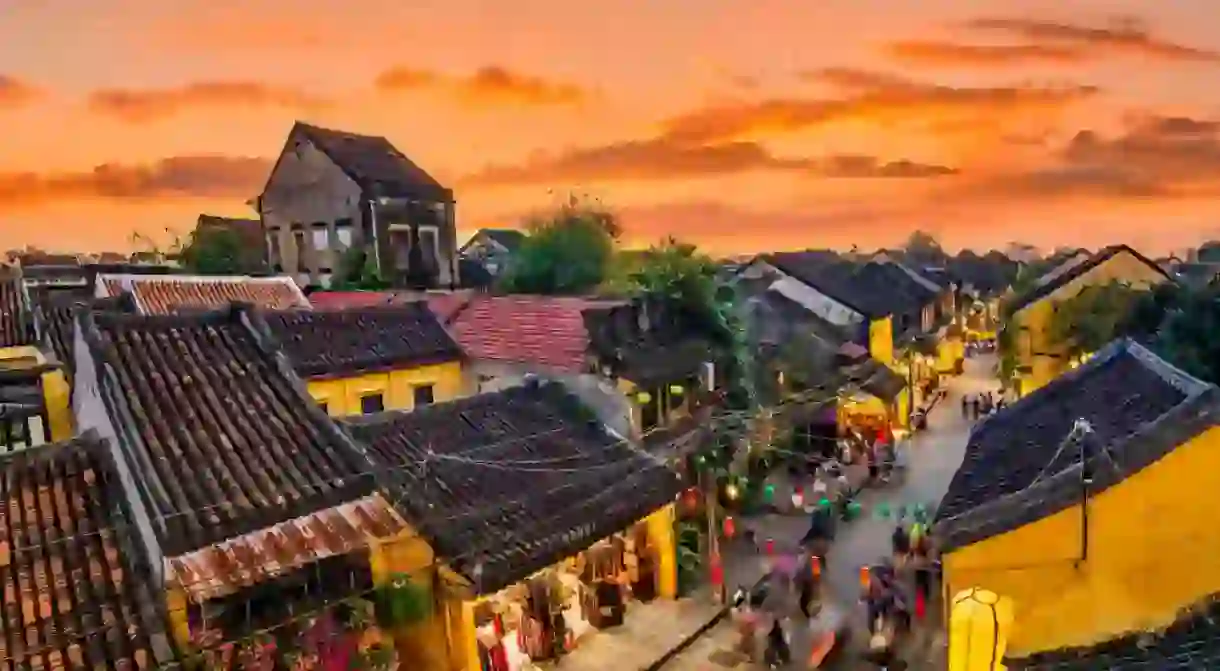The Top Things To Do and See in Hoi An, Vietnam

An intoxicating blend of ancient culture, fascinating architecture, delectable cuisine and diverse landscapes, Hoi An has plenty to entice those in search of authentic Vietnamese experiences. Here’s what to do and see in this compelling, historic city.
Enjoy a traditional Hoi An water puppet show
Theatre
A great way to get under the skin of local culture, this re-creation of Vietnamese traditional village tales through the medium of puppets who seem to float on the water is a delight for all ages. An English-language narration helps you keep up with the light-hearted storylines. Make sure to pre-book – these hour-long shows (made up of several mini-tales) are deservedly popular.
Learn to make traditional Vietnamese dishes
Building, Market, Buddhist Temple

Replicate generations-old regional specialties in lively classes at the Gioan Restaurant and Cooking School. You’ll start with a trip to the local market to pick up ingredients and continue with personalised lessons from one of the charming in-house chefs – dishes might include pho, spring rolls, banh xeo (a type of crepe) and green papaya salad, but choose for yourself from a vast selection. The lesson culminates with a feast of your own making, accompanied by a beer or cola. You can also get a recipe book so you can put your newly found skills to work when you get home and relive the experience.
Discover the Old House of Tan Ky
Historical Landmark, Architectural Landmark
Built in the 18th century for a Vietnamese merchant clan, the Progress Shop – still a private home with the family living upstairs – is one of the most historically significant buildings in Hoi An’s picturesque old town. The architects drew on Japanese, Chinese and Vietnamese building styles for inspiration. Hire a private guide for a tour of the ornately decorated, antique-filled rooms and you’ll gain a glimpse into what life was like for more than seven generations of Hoi An merchants. Watch out for details such as columns decorated with mother-of-pearl Chinese poems and carvings under the eaves.
Get a tailormade suit
Natural Feature
Hoi An has been central to Southeast Asia’s textile trade for centuries and the streets are filled with skilled tailors and leather workshops where you can have any item of clothing or accessory you like made to order. Avoid low-quality, less-established places by checking the latest online reviews (avoid the recommendations of hotel staff or taxi drivers) and shopping around for the best rates based on exactly what you have in mind.
See the Japanese Bridge
Bridge, Buddhist Temple

Take a trip out of town
Natural Feature

Hoi An is surrounded by lush countryside, so make sure to venture out of the city during your stay – a wide choice of cycling and trekking tours can take you out to paddies, hills, villages and blissful beaches. Alternatively, hire a driver for a day trip – perhaps to Da Nang (about 45 minutes away) – home to the gorgeous Son Tra Peninsula and the Marble Mountains or to the Cam Thanh coconut forest to learn how to row and control a traditional basket boat.
Visit the night market
Market
The island of An Hoi, across the river from central Hoi An, is home to one of the most beautiful night markets in Vietnam, selling lanterns of all shapes, sizes and colours made from Hoi An silk. The sight of thousands of lanterns lit up in the dark is well worth the river crossing alone, but there are also trinkets, clothes, jewellery and other accessories and stalls selling local snacks on which to munch as you browse.
Kick back on An Bang Beach
Natural Feature

Hoi An’s most famous beach is Cua Dai, west of the city, but head to An Bang just north for a more peaceful seaside interlude. You’ll be rewarded with white sands, alluring beachfront restaurants and even romantic beachside villas.
Admire the Fujian (Phuc Kien) Assembly Hall
Archaeological site
Take a day trip to the My Son ruins
Ruins

The Best Trips and Tours in Vietnam
Natural Feature

Vietnam has many amazing charms, including its bustling vivacious cities, its magnificent natural landscapes and its wonderfully welcoming locals. From the buzzing streets of Ho Chi Minh City to the placid shores of Phu Quoc island, there’s so much to see and do – and these tours and trips will help you make the most of your visit to this stunning country.
This is an update of article by Jing Xuan Teng.













